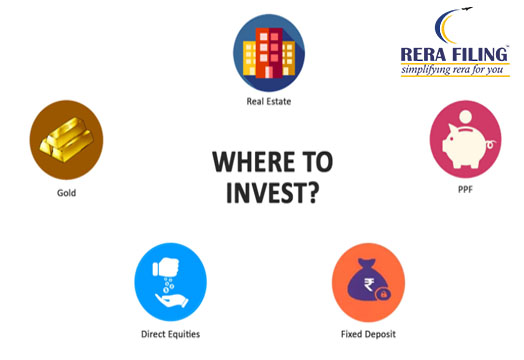Where to invest in India?

- Saturday 25th May 2019
- Author: Shreya Uppal
Highlights
How can one earn more without having to work 24*7? All you have to do is make your money work for you. That’s what investment is all about.
Non-financial assets - most Indians invest via this mode - are the likes of gold and real estate.
The only attractive point of this is that over long periods, equity has been able to deliver higher than inflation-adjusted returns compared to all other asset classes.
Investing isn’t all that easy. One need to invest at the right time, in the right quantity and at the right place- Everything needs to be in an optimum manner. An individual need to identify the right asset, evaluate whether it is in line with the personal goals, and then build a strategy to generate good returns.
Everybody wants a secure future with a comfortable financial cushion. How can one earn more without having to work 24*7? All you have to do is make your money work for you. That’s what investment is all about.
There are two buckets that investment products fall into - financial and non-financial assets. Financial assets can be divided into market-linked products (like stocks and mutual funds) and fixed income products (like Public Provident Fund, bank fixed deposits). Non-financial assets - most Indians invest via this mode - are the likes of gold and real estate. Some of the best investment options are described below:
1. Direct Equity
Investing in stocks may not be everyone’s cup of tea as it is a volatile asset class and there is no guarantee of returns. One needs to be highly analytical, updated and needs to be strong enough to bear the losses which occur in the initial stages. Also, it is difficult to pick the right stock at the right time. The only attractive point of this is that over long periods, equity has been able to deliver higher than inflation-adjusted returns compared to all other asset classes.
One has to open a DEMAT account to invest in direct equity and all the transactions are linked through the banking channels on which tax shall also be deducted.
2. Peer to peer lending (P2P)
Peer-to-peer lending is the practice of lending money to individuals or businesses through online services that match lenders with borrowers. Since peer-to-peer lending companies offering these services generally operate online, they can run with lower overhead and provide the service more cheaply than traditional financial institutions. As a result, lenders can earn higher returns compared to savings and investment products offered by banks, while borrowers can borrow money at lower interest rates, even after the P2P lending company has taken a fee for providing the match-making platform and credit checking the borrower.
In India, peer-to-peer lending is currently regulated by the Reserve Bank of India, India's Central Bank. It has published a consultation paper on regulation of P2P lending . There were over 30 peer-to-peer-lending platforms in India in 2016. Even with first-mover advantage many sites were not able to capture market share and grow their user base, arguably because of the reserved nature of Indian investors or lack of awareness of this type of debt financing. However, peer-to-peer lending platforms in India are helping a huge section of borrowers who have previously been rejected or have failed to qualify for a loan from banks. Peer to peer lending has helped consumers with no or poor credit scores get loans in categories such as consumer lending, small business lending and property lending.
Paisa Dukaan became the first new entrant in Peer to Peer Lending market to get Certificate of Registration (COR) from the Reserve Bank of India (RBI) in Indian history. In 2019, two more companies, Rupee Circle and India Money Mart, were licensed by the Reserve Bank of India.
3. Equity Mutual Funds
Equity Mutual Funds mainly invest in equity stocks. As per SEBI (Securities and Exchange Board of India) Mutual Fund Regulations, an equity mutual fund scheme must invest atleast 65% of its assets in equities and equity related instruments. Returns are largely dependent on a fund manager’s ability to generate returns. As compared to direct equity they are far better as it comprises of a portfolio comprising of different varities of investments.
4. Debt Mutual Funds
These are ideal for those investors who want steady returns. They are less volatile, and are less risky as compared to equity mutual funds as they mainly invest in Fixed-interest generating securities like Corporate bonds, government securities, treasury bills, commercial paper and other money market instruments.
5. Gold
One of the oldest investment options, gold has historically been a very popular asset. The simple reason is its consistently increasing price over time. While it isn’t performing nearly as well as it used to, the markets have evolved to offer customers many new ways in which you can invest in gold – like gold deposit scheme, gold ETF, gold bars and gold Mutual Funds.
6. Real Estate
In India, investing in real estate is considered one of the safest bets by investors. The location of the property is the single most important factor that will determine the value of the property and also the rental it can earn. Investments in real estate deliver returns in two ways- Capital Appreciation and Rentals. Real estate is highly liquid. With the introduction of RERA (Real Estate Regulation and Development Act), 2016 the transactions of the property dealings has become more transparent and safe, thus benefiting the ultimate buyer and thus building trust in the sector.
7. Public Provident Fund
It is one of the safest option people gets attracted to. The best part about investing in a PPF is that an individual is not required to pay tax on the interest he earns from PPF. The money deposited in PPF account gets locked for a period of 15 years and compound interest is earned on it.
8. Bank Fixed Deposit
It is a good choice to invest money. Under the Deposit Insurance and Credit Guarantee Corporation (DICGC) Rules, each depositor in a bank is insured upto a maximum of Rs.1 lakh for both interest and principal amount. As per the need, one may opt for different options available in it. The interest earned is added to one’s income and is taxed as per the slab rate of an individual.
9. RBI Taxable Bonds
The Reserve Bank of India (RBI) is currently issuing 7.75% Savings Taxable Bonds which come with a tenure of 7 years. These bonds may be issued in demat form and credited to the Bond Ledger Account (BLA) of the investor and a Certificate of Holding is given to the investor as a proof of the investment. As governed by the regulations of RBI, they are highly safe.
10. Post Office Schemes
If one is looking for a short term investment plan, he should definitely consider the Post office schemes which are offered by the Indian Postal Service. One of the best schemes is Monthly Income Scheme which offers high return with minimal risk.
11. Unit Linked Insurance Plan (ULIP)
A Unit Linked Insurance Plan is an option that offers investments in bonds and equities, along with protection via insurance. In this type of plan, a part of your premium is invested in the stocks and bonds as determined you, and the rest is paid towards a life insurance cover. Just like any other investment option, it involves some amount of risk.
The above mentioned are some of the best options available in the Indian Market, there can be many more.
Now comes the most important part which is how to choose which option is the best investment option, the answer to this question varies from case to case and requirements of an individual.
More Articles
- Online Listing Tips for Real Estate Agents
- How to start a Real Estate business in India - a complete guide !
- Renting Vs Buying property - How will you decide?
- What you should do in Property Management services
- Home Loan Insurance
- How to choose your builder?
- How to ensure fire safety in your home!
- Tips To Keep In Mind While Taking A Home On Rent
- Importance of Home Security
- How to plan your property budget?
- Leased vs. Purchased vs. Co-Working Office Spaces
- Easy Tips to Build an Eco Friendly Home
- Sample Flat - A Trick by a Builder?
- How to have a Beautiful Guest Room? Impress your Guests with these Guest Room Ideas..
- Understanding MCLR and its Effects on Home Loans
- 5 simple ways to close a real estate deal
- Is it worth to buy property near an airport ?
- Home loan tax benefit
- How to be successful in business as an introvert
- Cost effective home decor ideas
- What to Be-Paying Guest or a Tenant??
- Complete guide to start your small business
- Sports township- New trend in India
- Online Listing Tips for Real Estate Agents
- Understanding Floor Area Ratio- FAR
- Town and Country Planning | Meaning and Importance
- Checklist of Important Property Documents- All You Need to Know
- Role of CREDAI in real estate
Copyright © 2023 RERA Filing. All rights reserved.
 Rera
Act
Rera
Act
 Maharashtra
Maharashtra Karnataka
Karnataka Andhra Pradesh
Andhra Pradesh Uttar Pradesh
Uttar Pradesh